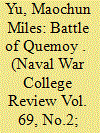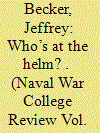|
|
|
Sort Order |
|
|
|
Items / Page
|
|
|
|
|
|
|
| Srl | Item |
| 1 |
ID:
146445


|
|
|
|
|
| Summary/Abstract |
In the annals of the communist world, the month of October enjoys supreme sanctity. The Red October of 1917 ushered in the first socialist government, which would eventually become the Soviet Union. In the People’s Republic of China (PRC), October is indelibly enshrined as the anniversary month of the founding of the communist state, observed with a multiday national celebration. But each year, amid glorious celebratory glow marking the inauguration of the PRC, the memory of a forbidden and inglorious episode surfaces—inevitably, albeit surreptitiously and furtively—within China’s educated and political elite. The event took place a little over three weeks after Mao Zedong triumphantly announced at Tiananmen Square, on 1 October 1949, the establishment of the People’s Republic.
|
|
|
|
|
|
|
|
|
|
|
|
|
|
|
|
| 2 |
ID:
146442


|
|
|
|
|
| Summary/Abstract |
In late 1990, veteran U.S. Navy strategist Captain Peter M. Swartz was preparing to return to the United States after a three-year joint assignment at the U.S. mission to NATO in Brussels, Belgium. Swartz desired to return to the Office of the Chief of Naval Operations (OPNAV) and to the business of naval strategy in which he had been so engaged during the previous decade. Swartz was advised strongly by his mentor in Brussels, Admiral Jim Hogg, the U.S. military representative to NATO’s Military Committee, to take instead a position as a special assistant to the Chairman of the Joint Chiefs of Staff (CJCS), General Colin Powell, U.S. Army. Swartz reiterated that he was not interested in yet another joint job but instead desired to return to the business of creating and disseminating naval strategy.
|
|
|
|
|
|
|
|
|
|
|
|
|
|
|
|
| 3 |
ID:
146446


|
|
|
|
|
| Summary/Abstract |
The political thought of Admiral Alfred Thayer Mahan was a response to two particular waves of American progressivism. Social Darwinism, the first wave, in its most secular, conservative, and unadulterated form, claimed that the human race is constantly progressing, that the survival of the fittest is embedded in the historical unfolding of history, and that morality is conditioned by the contingencies of one’s historical epoch. Social Darwinism led to an emphasis on human selfishness, competition, and the following of one’s interest.
|
|
|
|
|
|
|
|
|
|
|
|
|
|
|
|
| 4 |
ID:
146444


|
|
|
|
|
| Summary/Abstract |
China’s navy is undergoing a leadership transition not seen in a generation. Between late 2014 and the time of this writing (spring 2015), the upper echelons of leadership within the People’s Liberation Army Navy (PLA Navy, or PLAN) began experiencing substantial change in personnel, with eleven of the fourteen positions on the navy’s Party Committee Standing Committee (referred to below as the PLAN Standing Committee)—the navy’s highest decisionmaking body—turning over.
|
|
|
|
|
|
|
|
|
|
|
|
|
|
|
|
|
|
|
|
|